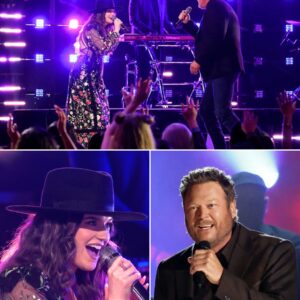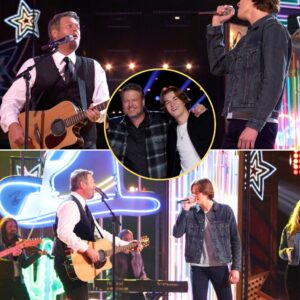In the opulent glow of Hollywood’s Ray Dolby Ballroom, where chandeliers drip like liquid gold and the air hums with the quiet thunder of applause, Dolly Parton etched another glittering chapter into her extraordinary tapestry on November 16, 2025. Absent in person but ever-present in spirit, the 79-year-old country colossus accepted the Jean Hersholt Humanitarian Award at the 16th Academy Governors Awards via a heartfelt pre-recorded video, her sequined smile beaming across screens like a beacon from the Smoky Mountains. This wasn’t just any accolade; it was her first Oscar statuette—a gleaming Oscar that joined the ranks of her 10 Grammys, her Emmy, and a shelf groaning under the weight of Country Music Hall of Fame induction and countless other honors. But more than hardware, it’s a heartfelt homage to a woman whose philanthropy has quietly revolutionized lives from the hollers of East Tennessee to the farthest reaches of the globe. “I’ve been blessed more than I ever dreamed possible,” Dolly drawled in her acceptance, her voice a velvet ribbon laced with that signature Tennessee twang. “Like this award tonight—the Jean Hersholt Humanitarian Award from the Academy of Motion Picture Arts and Sciences. It makes me want to dream new ways to lift people up.” As Andra Day’s soulful rendition of “Jolene” swelled in the aftermath, sealing the moment with a standing ovation, the room—packed with luminaries like Tom Cruise, Debbie Allen, and Lily Tomlin—rose not just for the icon, but for the indelible imprint she’s left on a world forever brighter for her touch.
The Governors Awards, that invitation-only soiree where the Academy bestows its honorary Oscars away from the Oscars’ frenzy, has long been a velvet-rope rite of passage for cinema’s quiet giants. This year’s affair, a star-studded swirl of black ties and bold gowns at Ovation Hollywood, honored Parton alongside Cruise’s lifetime achievement nod, Allen’s trailblazing tribute, and production designer Wynn Thomas’s craft mastery. But it was Dolly’s moment that stole the spotlight—or rather, refracted it through her rhinestone prism. Academy President Janet Yang, in her June announcement, captured the essence: “Beloved performer Dolly Parton exemplifies the spirit of the Jean Hersholt Humanitarian Award through her unwavering dedication to charitable efforts.” Named for the Danish-American actor and humanitarian who championed the Motion Picture Relief Fund, the Hersholt recognizes those whose off-screen impact “brings credit to the industry by promoting human welfare and contributing to rectifying inequities.” Parton joins an elite cadre of music mavens who’ve clutched this golden honor: Frank Sinatra in 1970 for his civil rights crusades, Quincy Jones in 1994 for bridging racial divides through jazz, Harry Belafonte in 2014 for his activism tapestry, and Debbie Reynolds in 2015 for her Thalians fundraisers. For Dolly, it’s a full-circle flourish—her film forays like 9 to 5 (1980) and Steel Magnolias (1989) earned her acting cred, but it’s her heart’s work that cements her as Hollywood’s unofficial ambassador of grace.
:max_bytes(150000):strip_icc():focal(749x0:751x2)/dolly-parton-16th-governors-awards-111725-2-4452266a02994109aad3ea247e2870e8.jpg)
Dolly Rebecca Parton entered this world on January 19, 1946, the fourth of 12 children born to a poor tobacco sharecropper and his resilient wife in the Appalachian hamlet of Locust Ridge, Tennessee. Poverty was a constant companion—her family of 14 squeezed into a one-room cabin without electricity or running water—but love was the great leveler, woven into every quilt and fiddle tune. Young Dolly, with her wild mop of curls and a voice that could hush the hollers, dreamed big from the cradle. By age 10, she was commuting to Knoxville for radio spots on the Cas Walker Program; by 13, she inked her first record deal. But beneath the sequins and showbiz sheen lay a steely resolve to repay the kindnesses that lifted her—neighbors who shared meals, teachers who saw her spark. “I was determined to make it so I could buy Mama a pink house,” she’d later quip, but her ambitions swelled far beyond bricks and mortar. Nashville beckoned in 1964, where she honed her craft as a songwriter for Porter Wagoner, penning hits like “Put It Off Until Tomorrow” that snagged a Grammy. Her solo ascent was meteoric: 1977’s Here You Come Again topped charts, “Jolene” became a feminist anthem in velvet gloves, and “I Will Always Love You” (1974) poured her soul into a ballad that Whitney Houston later rocketed to immortality. Over six decades, she’s amassed 49 studio albums, 25 No. 1 country singles, and sales eclipsing 100 million—yet Dolly’s true discography is written in lives transformed, not liner notes.
Her philanthropic odyssey kicked into high gear with the founding of the Dollywood Foundation in 1988, a nonprofit engine room dedicated to uplifting the very communities that cradled her childhood. Inspired by her illiterate father’s quiet dignity—Walter Parton, who signed his name with an X—Dolly poured her energies into education, convinced that books were the great equalizers. The crown jewel? Dolly Parton’s Imagination Library, launched in 1995 as a Sevier County pilot to mail one free book monthly to every child from birth to age five. What began as a local love letter exploded into a global lifeline: today, it blankets all 50 U.S. states, plus Canada, the U.K., Australia, and beyond, disbursing over 285 million volumes to date. “I want every kid to feel like they’re somebody,” Dolly has said, her eyes twinkling like fireflies in the holler dark. The math is staggering: that’s a book in the hands of a child every 30 seconds, fostering literacy in homes where shelves are sparse and stories scarce. Studies from the program show recipients outperforming peers in early reading skills by up to 20%, a ripple effect that cascades into higher graduation rates and brighter futures. Funded by Dolly’s royalties, corporate sponsors like Penguin Random House, and everyday donors, it’s a model of scalable sparkle—proof that one woman’s whim can weave a worldwide web.
But Imagination Library is just the opening act in Dolly’s grand giveaway. The Dollywood Foundation’s tentacles stretch into scholarships, disaster relief, and cultural conservation, all rooted in her East Tennessee ethos of “dream more, learn more, care more, be more.” In 1986, she opened Dollywood, the Smoky Mountain theme park that’s pumped over $3 billion into the local economy, employing 5,000 souls and spotlighting Appalachian artisans through its crafts village. It’s no mere amusement arcade; it’s a living love letter, with proceeds fueling scholarships that’ve sent thousands of Sevier County kids to college—Dolly footing $500 per student annually in the ’80s, evolving into full-ride endowments today. Her response to calamity is swift and selfless: $1 million to Los Angeles wildfire victims in 2018, $500,000 to Puerto Rico post-Maria in 2017, and swift aid to Gatlinburg’s 2016 blaze that razed her backyard. Animal lovers owe her a howl too—her 2003 Partnership Award from the U.S. Fish and Wildlife Service salutes Dollywood’s American Eagle Foundation, a bald eagle sanctuary that’s rehabilitated hundreds of the national symbols since 1985. And in 2020, as COVID-19 cast its shadow, Dolly didn’t flinch: she donated $1 million to Vanderbilt University Medical Center, turbocharging Moderna’s vaccine research. “My money’s on the scientists,” she joked in her viral “Jolene” vaccine plea, but her gift—paired with a folksy fundraiser netting another million—helped propel the shot that saved millions, earning her a spot in TIME’s 2021 TIME100 Philanthropy list.
Dolly’s giving knows no borders or biases; it’s a rainbow coalition of compassion. She’s funneled fortunes into the Barbara Davis Center for Childhood Diabetes, Save the Music Foundation (revitalizing school band programs), and the Boot Campaign for wounded vets. Her $10 million investment from “I Will Always Love You” royalties seeded Nashville’s Black neighborhoods, combating food deserts with community gardens. LGBTQ+ allies hail her as a sequined saint—fundraising for GLAAD since the ’90s, marching in Pride parades, and quipping, “God loves all his children, and I do too.” In 2022, the Carnegie Medal of Philanthropy crowned her “innovative” for scaling impact without ego, a rare feat in a celebrity charity circus often criticized for flash over follow-through. Jeff Bezos amplified her reach with a $100 million Bezos Earth Fund grant, fueling eco-initiatives like wildfire recovery in her beloved Smokies. “I don’t do this for praise,” Dolly demurs, but her ledger speaks volumes: billions boosted, barriers broken, a blueprint for blending fame with fortitude.
The Governors Awards ceremony, a black-tie bash of Hollywood’s heavy hitters, wove Dolly’s tapestry with tributes that tugged every heartstring. Lily Tomlin, her 9 to Five comrade, delivered a 15-minute improvised ode—meandering from Jane Fonda’s script flip to Dolly’s “Two Doors Down” serendipity—that had the room howling and hankies at the ready. “Dolly’s power is one the world needs right now,” beamed Julia Roberts via video, her Steel Magnolias co-star lauding the empathy that “builds up, never tears down.” Tom Cruise, fresh from his own honor, called her an “American original” whose soul threads the nation’s fabric. Andra Day’s “Jolene” encore, a smoky slow-burn that twisted the jealousy anthem into a jubilant jig, capped the cascade, the crowd on its feet as if Dolly herself had rhinestoned the rafters. Absent due to health whispers—Dolly’s been candid about her age’s aches, opting for virtual from Nashville—it was a poignant proxy, her video a masterclass in grace: bedazzled blouse, beehive unbowed, words wrapping the room like a warm quilt.
This Oscar isn’t an endpoint; it’s an exclamation. At 79, Dolly’s still dreaming—her 2025 Dolly Netflix anthology series reimagines her hits with rising stars, while Rockstar Global’s literacy push eyes a billion books by decade’s end. Her legacy? A lighthouse for the lost: from Locust Ridge’s lean-tos to global classrooms, she’s proven glamour and grit can coexist, that one sequined soul can stitch a safer world. As the Governors’ lights dimmed, one truth twinkled eternal: Dolly Parton doesn’t chase awards; she earns them, one heartfelt hand-up at a time. In her words, “Find out who you are, and do it on purpose.” The King—no, Queen—of Country has spoken, and the world is all the richer for listening.




